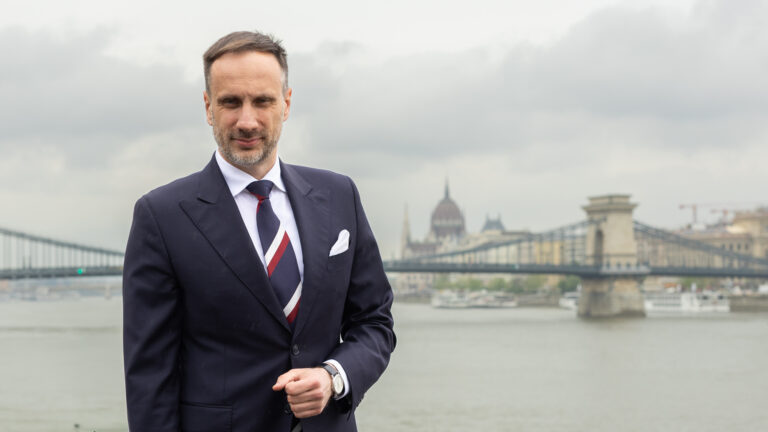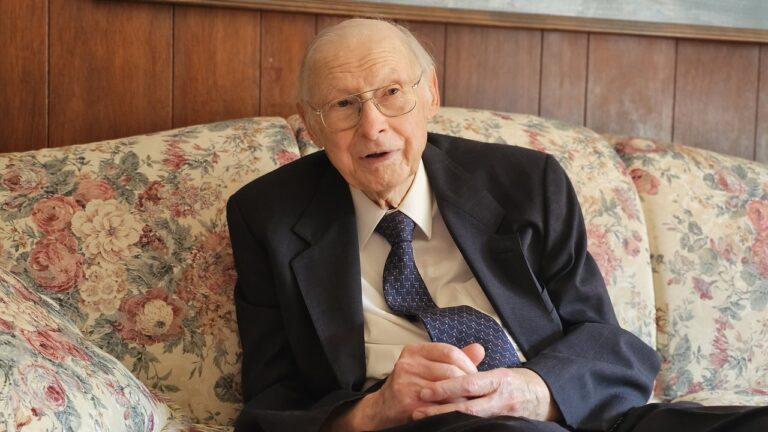Miriam Cates served as a Member of Parliament for Penistone and Stocksbridge as a member of the governing Conservative Party from 2019 to 2024. She is now a presenter at the British news channel GB News and a contributor to such online news outlets as UnHerd, The Critic and The Telegraph. She was one of the distinguished speakers at the the Danube Institute’s Family Formation and the Future conference in Budapest, Hungary, and was gracious enough to sit down for an exclusive interview for Hungarian Conservative during the event.
***
One thing I have always wondered about concerning UK politics as an outsider is that the Conservative Party won four elections in a row between 2010 and 2019. In an American context, that would be like basically the end of the other party. Not historically, but today that would mean the brink of collapse for the other side. But yet, culturally, the United Kingdom isn’t seen as a conservative hub. For example, you talked yesterday about how being a nativist in the UK is still a fringe position. Why is that disconnect? Because despite so many election wins in a row, the culture hasn’t moved that right.
Great question. I think the short answer is because the Conservative Party is not conservative, it’s liberal. And because we have only a two-party system in the United Kingdom, or at least until very recently we only had two major parties, the Labour Party and the Conservative Party, thus liberals, classic liberals, have migrated to the Conservative Party. The majority of Conservative MPs are liberal and not conservative. So, for instance, David Cameron was a liberal. He wasn’t a conservative.
I think the problem really stems from back to the Cold War. It’s a bit similar to America. The Liberals and the Conservatives made an alliance to defeat communism. It was very successful, but ever since then liberalism has been mistaken for conservatism and conservatives have had very little representation in public life. So unfortunately, although in name we’ve had a conservative government for 14 years, it was not conservative, and the things that it oversaw—masses of increase in family breakdown, huge increases in immigration, increases in public debt, gay marriage, no fault divorce—all these things are not conservative and yet they were done by conservative governments. I think that’s the first answer. The second I think is that because in Britain we didn’t experience invasion in the Second World War and because we’re an island, we kind of assume that our culture is just protected without any deliberate intention. Whereas, obviously, the experience of mainland Europe is totally different. If you don’t fight for your national identity, your borders, and your culture, you know that they’re under threat. We don’t feel that threat in the UK and therefore we’ve been really lax and undiligent in thinking about what it means to be British. So we don’t know what it means to be British and we’ve just become American. So if you look at our high streets, they are full of American chains. There are no independent shops like there are in France or here in Hungary, it’s just Starbucks and McDonald’s, and every single high street in every town is just American. So we haven’t protected our culture base.
You were in Parliament for five years.
Yes.
Did you have any kind of debates about these issues that you have just brought up and how far did they go? Have there been any solutions proposed while you were there?
Yes, there was a group of us in Parliament. I mean, there are plenty of fantastic Conservative MPs in the Conservative Party, it’s just that we weren’t the majority. And the way that the numbers work in politics is you can’t get much done. I think what we did manage to achieve was to make it much more possible to talk about immigration, the family, children, those kinds of things. I think five years ago these topics were completely taboo in the UK media. Whereas a combination of factors, firstly, yes, obviously us talking about it, but also just the demand from ordinary people to talk about these things has really changed the media space in the UK, even if not yet politics.
Was this more conservative wing of the Conservative Party aware of Viktor Orbán’s Hungary and what they were doing for us, for example, in family policy? Obviously, we are at a family formation conference hosted by the Danube Institute. So was there some kind of awareness of Hungarian politics?
Not much. I think amongst actual conservatives in London, so people who populate the think tanks and the conservative media, a lot is known—and very much admired—about what's going on in Hungary. However, because liberals still dominate, and unfortunately they kind of believe the propaganda about things being far-right and all those kinds of things, I would imagine that amongst liberals there's a kind of general disapproval. But what is interesting is that in just the last couple of years, even the liberal media have started to cotton on to the fact that low birth rates are a disaster economically and socially, and suddenly mainstream papers like The Times, even The Guardian are waking up to the birth rate crisis; I think they are eventually going to come to the conclusion that actually only strong families—and incentivizing strong families—are the answer. So I think there's a kind of thawing of relationship with what's going on in Hungary and I think people will start to see that actually it's the only option.
Is it your first time here?
Yes, yeah.
How is your experience?
Oh, I'm really, really enjoying it. I mean, I've wanted to come for quite a long time because as I said, everybody in conservative circles in London has been here. It's just fantastic. I mean, it’s a beautiful city. The view is just incredible, but I think the quality of the speakers here and what they've got to offer from talking about crime to family policy to feminism is also fantastic. I thought Balázs Orbán was fantastic this morning—I was like, if only we had politicians like that in the UK. It's inspiring, it feels exciting; actually I think you're spearheading something that hopefully is going to spread across Europe and the West. So yeah, I'm really enjoying it.
So let me ask you about your current Prime Minister, Keir Starmer. He won with a large majority in 2024, but within a few months, his approval rating dipped to, I think somewhere in the 20s. Which is, again, in the American context, that would be like George Bush in 2008.
Yeah.
What happened there? What was this rapid decline in approval for him?
Well, he won a big majority but they only got less than 30 per cent of the vote. I think because our system is very strange, it's first past the post, it amplifies any differences between the parties. They got 30 per cent of the vote and 60 per cent of the seats in Parliament, so the party was never that popular. It's just that the right-wing vote was split between Conservatives and Reform, which meant neither of us got many seats in Parliament.
So they weren't that popular to start with and I think there was a series of events that happened over the summer: the riots, there was a kind of semi-scandal about Labour ministers accepting free gifts—nothing illegal but some things that people disapproved of. And then there was a budget that hit small businesses and raised inflation. So yeah, I mean, he's got bad approval ratings. But to be honest, I think social media and the mainstream media have destroyed trust in politicians over the last 15 years to such an extent that very few politicians in Britain now have ever gotten good approval ratings. I'm obviously no great supporter of Keir Starmer but I don't think he's anywhere near as dreadful as some people thought he would be.
Recently US Vice President JD Vance has talked about the issue of free speech in the United Kingdom. Do you agree with his sentiment that free speech is under attack in your country?
Yeah, I think he’s right. We're not a police state or anything like that, and I think free speech always wins because we've got very good lawyers and we've got the Free Speech Union, which is a fantastic organization that defends even ordinary people who have fallen foul of various laws. So I wouldn't say that we're a police state, but on the other hand, there has been such a chilling effect on free speech by certain pieces of legislation like the Equality Act, which means that you can be prosecuted for harassing someone on the basis of being transgender or their race if the victim perceives that that's why you've targeted them. It doesn't have to be real, there doesn't have to be any truth in it, it's just their perception.
So, we do have some very anti-free speech laws. And so, yeah, I think JD Vance is right. And on the issue of the abortion clinic, the so-called buffer zones which is what he's picked up on: I was in Parliament when Parliament voted for those. Obviously I voted against, lots of us voted against, but the progressives sold it as an abortion issue rather than a free speech issue, and so therefore they got it through because of the majority of liberals in parliament. And it is absurd, I mean in Scotland it is actually the case that in theory you could be prosecuted for praying in your own home if your own home is within one of these buffer zones. So they are absurd, but the law would have to be overturned to do anything about it.
As someone in British media for GB News, do you have any concerns about litigation when you publish a news piece or do a news segment? Is it an everyday concern for you?
Well, there were certainly a lot of attacks on GB News and still are. There are a lot of liberals who prefer that GB News didn't exist. GB News is regulated by Ofcom, which is our broadcast regulator, and Ofcom has brought a number of cases against GB News, but actually GB News has done a brilliant job of defending itself and won a number of landmark cases recently that essentially show that Ofcom unfairly penalized GB News. So I think actually it's got now to a very strong position. It's a major player in the media landscape at present. Our ratings are going up and up and up. We're beating Sky News all the time, beating BBC News some of the time. So I think we are now in an established position. We're now part of what's called the media round, which is where senior politicians come to GB News every day as well as BBC and Sky, so it feels like it's reached a much more established place now.
Related articles:








